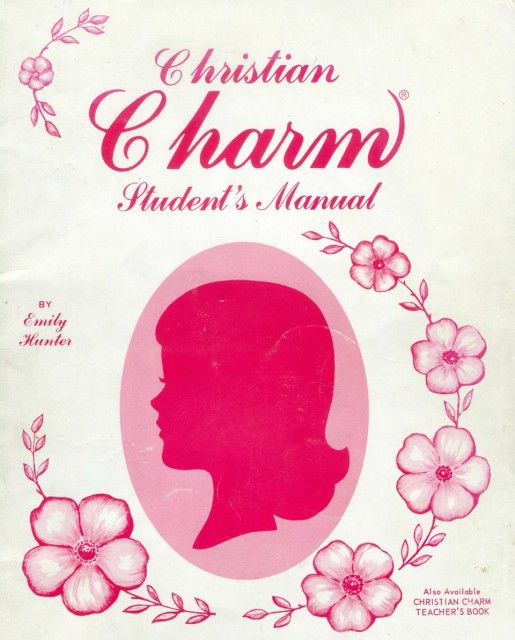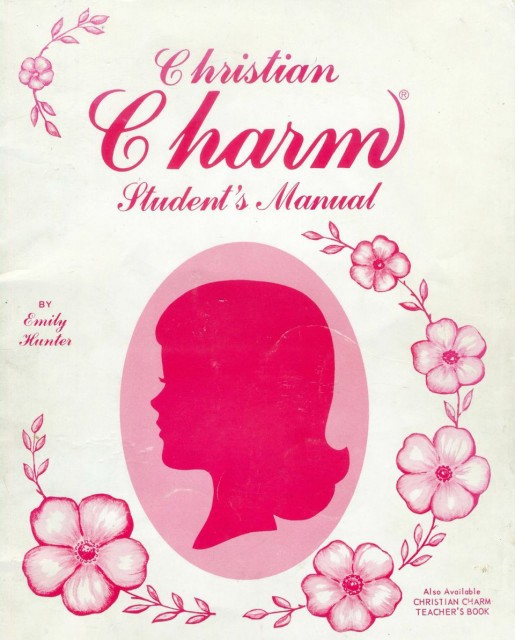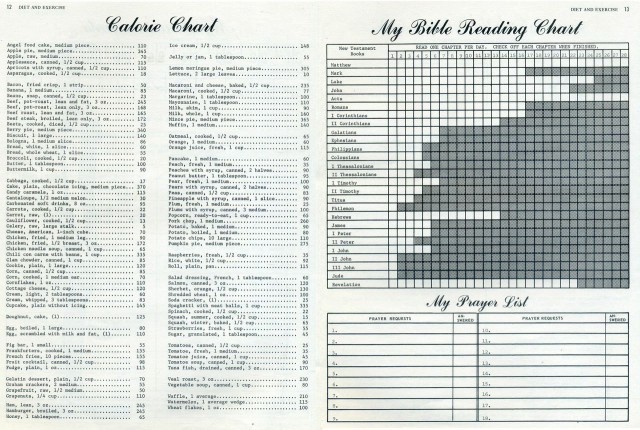The Best Time I Went to Christian Charm School
by Susan Blue


In 1981, supermodel Cheryl Tiegs wore a plaid shirt on the cover of the Sears catalog. Tootsie Roll lip balm was the latest innovation in skin care, and Leggs pantyhose took up more aisle space than you’d think in drugstores.
That was the year I attended Christian charm class. In the same decade where Madonna sang about feeling like a virgin, the Christian Charm Manual was required reading for girls at my school.
I attended a Baptist school befitting my family’s evangelical fundamentalist persuasions. Girls wore skirts that extended at least two inches below our knees, a detail subject to inspection by the principal’s wife, who wore her hair in a permanent beehive. But the dress code wasn’t enough in 1981. It was time for our official submissiveness training.
The pink-accented manual still in my possession is a meandering onslaught of Biblical warnings and hair care instructions. Early in the workbook, the prayer to become a born-again Christian is complemented, presumably for the first time in 2,000 years of church history, by another vow: “I want to be attractive and charming, so that I will please others. I realize that this will not come about through wishful dreaming…I must work toward that goal diligently and steadfastly.”
I was already a literalist — I believed I would live forever in a mansion in heaven, where I would wear a crown to show how admirably I’d conducted myself on earth. Adding religion to my beauty care wasn’t my biggest leap of faith.
One of the book’s lessons equates holiness and calorie counting: a two-page spread features a calorie-counting chart on one side and a Bible-reading checklist on the other. The book told us the proper ratio of bust, waist and hip measurements. It told us to “take the Lord Jesus Christ shopping with [us].” It told us not to dye our hair. It told us not to “swish knees noisily” while walking. It told us to “avoid over-display of self” and to “sweeten [our] breath regularly with ‘God’s mouthwash.’” It labeled a smiling girl “YES” and a frowning girl “NO.” It called our gender “the weaker vessel” and reminded us in all caps: “DON’T USURP THE ROLE OF THE MALE.”
Beauty regimens are often confusing but rarely so demoralizing. While ads for beauty products make us disbelieve our natural beauty, charm school made us disbelieve our innate goodness. Maybe lip gloss has never been compared to original sin before, but it might as well happen at least this once.

You might wonder how I felt about all of these instructions, wearing my demure skirts and button-down blouses and boat shoes. I was happy to oblige, just like the book said I should be; but “happy to oblige” isn’t a feeling. Emotions weren’t really my thing. Pleasing Jesus was my thing. I filled in sections of the workbook as if my eternal future depended on it, which I thought it did. I took everything to heart in those days. Fundamentalism installed a checklist where my heart should have been.
Years later, I read a book called The Drama of the Gifted Child by Alice Miller. She writes about “the art of not developing feelings,” explaining that kids in an environment like mine don’t even experience their feelings secretly. I sure didn’t. I knew how to act, but not how to feel. I was too busy working on my crown in heaven. I wanted Jesus to be so proud of me when I walked through those pearly gates. I didn’t want some run-of-the-glory-mill crown. I wanted so many gems on my crown, you guys!
I was both earnest and exacting, some kind of evangelical doll. She quotes Bible verses and praises God and never, ever pees in her pants! Comes with miniature hymnal! Wages of sin sold separately. My smiling facade kept the real me safe from those who would condemn me to a literal fiery hell, or make my life on earth feel like it.
As a result, I didn’t really experience life as a kid; I observed circumstances and constantly assessed my place. There’s shame lurking somewhere in the middle of all that — the unfelt pain of my true self, belittled into silence. A girl deserves to feel sad and happy and angry and to experience those emotions spontaneously. And so does a woman.
I played out this charm school habit of mine for years, measuring life instead of experiencing it. When I untangled myself from religion after college, I started decreasing the lag time between what was happening around me and my reaction to it. Sometimes, minutes or hours or days later, I would realize that I’d had…a feeling. Freely experiencing whatever was actually happening and responding to it right then is basically my biggest goal in life as an adult, followed closely by trying as many unusual flavors of salt water taffy as possible.
I turned 30 before I understood that I should be a vulnerable human and not a perfectionist doll. Growing up, I thought being the model of charm was pretty great. But these are the stories we tell ourselves: sometimes a story that lasts forever beyond the pearly gates, and sometimes just until our hearts start beating.
Susan Blue lives in San Francisco, where she often wears a cardigan while writing a book about her escape from fundamentalism. She’d be charmed (in a good way) if you follow along on Twitter. Also, she has Charm School Dropout merit badges for you!